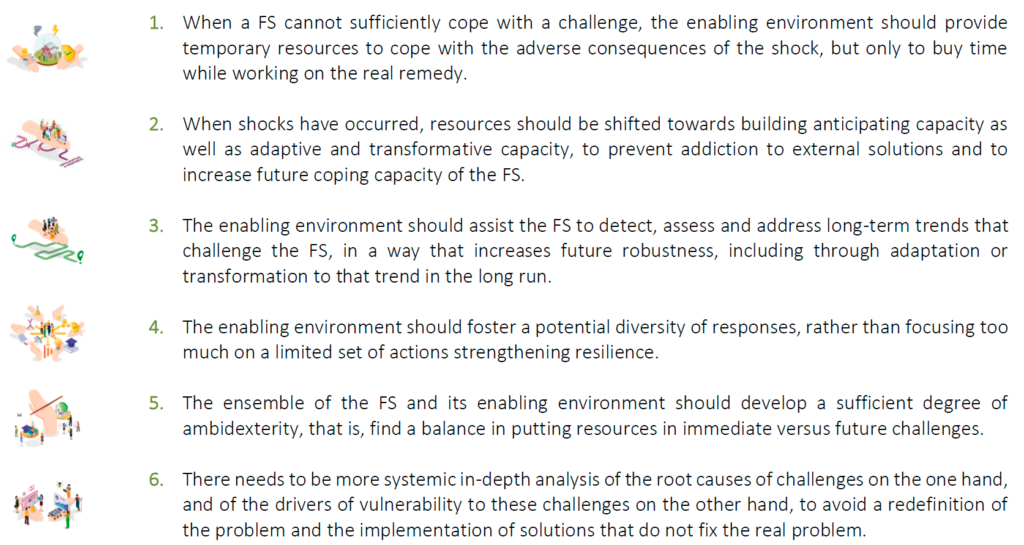Challenges that threaten the performance of farming systems have put resilience high on the agenda. Actions and strategies to stimulate the resilience of farming systems should follow six key principles that describe how actors in the farming system and its environment (governments, value chain businesses, banks, advisors and others) should act. How these principles translate into concrete recommendations is specific to regions and sectors. A co-creation process such as a policy dialogue should be created to develop roadmaps towards supporting resilience.
Challenges that threaten the performance of farming systems such as droughts and price drops, originating from stress and shocks such climate change, geo-political uncertainty, trade conflicts, changing consumer preferences and also the very recent COVID-19 crisis have put resilience higher on the agenda. Ensuring a resilient farming sector was among the prominent goals of the European Commission’s proposal for the Common Agricultural Policy (CAP) post-2020. The Green Deal, the Farm-to-Fork Strategy, the Biodiversity Strategy and the EU Recovery and Resilience Plan reinforced the call for enabling resilience. Hence, the institutional and socio-economic environment in which farming systems are embedded should stimulate the capacities of robustness, adaptability and transformability as well as its anticipating capacity.
SURE-Farm’s 6 key principles for enabling resilience
SURE-Farm has investigated the resilience of EU farming systems from various points of view and with a diversity of methods. Based on its work, SURE-Farm derived principles for enabling resilience and developed more concrete roadmaps towards higher farming system resilience. The resilience-enabling principles describe how actors in the farming system and the enabling environment should act to foster resilience. They are based on an analysis of the systemic behaviour of the system, i.e., the decisions made by the actors within the farming system and within its environment when dealing with challenges in the past.

Roadmaps towards resilience: need for a policy dialogue
The systems analysis has led to six principles to guide farming systems and enabling environment actors how to stimulate resilience. Translating these principles into concrete recommendations needs to be done through a regional and/or farming system specific approach. We advocate to set up a resilience enhancing policy dialogue gathering all relevant actors from a farming system and its environment. Policy dialogues, also called roundtables or task forces, bring diverse interest groups to the table, focus on an issue that is of common interest, and seek to formulate practical solutions to problems. Within the SURE-Farm project, such policy dialogue has been initiated in the form of a participatory roadmap workshop in 11 casestudies, with the aim to define actions and strategies to enable resilience, based on the defined principles. Recommended actions and strategies within the roadmaps that resulted from these workshop are case-study specific. Nonetheless, the following 14 common themes are proposed:
- Develop new institutional arrangements within the value chain and promote diversity of marketing channels
- Invest resources in product differentiation and new business models
- Increase investment in rural development and improve the attractiveness of rural areas, especially to the young
generation - Improve entrepreneurship of farmers through education, social learning and advisory services and strengthen AKIS
- Invest resources in adaptation of farming systems’ production and marketing modes
- Create awareness about long term trends and challenges within the farming system
- Reward farmers for their contributions to public functions
- Develop and maintain a long term vision at farm, farming system and policy level
- Invest in impact assessments of alternative (adapted or transformed) farming systems
- Develop institutions that allow more flexibility to farming systems
- Involve multiple actors in concerted efforts and address the institutional and structural mix rather than to rely on
single instruments - Stimulate a diversity of pro-active risk management strategies
- Facilitate access to land and labour
- Support for horizontal and vertical cooperation in rural development programmes
A broad range of stakeholders, farmers and policy makers share SURE-Farm’s perception that enhancing resilience is necessary and urgent. SURE-Farm is convinced that by addressing its six key principles and adopting its wider set of recommendations, stakeholders and policy makers, in a concerted effort, can enhance the resilience capacities of Europe’s farming systems towards the future.
For further information about the SURE-Farm project, visit the website: http://surefarmproject.eu
